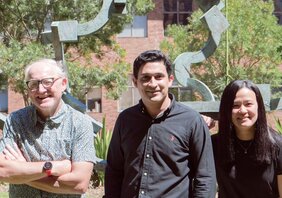
Australia’s national science organisation and its US research partner have stumped up more than $4 million to fund research into how AI can be used to improve the response to pandemics and drought.

It follows from an MoU signed between the CSIRO and the US National Science Foundation in January 2022 aimed at accelerating joint research in areas of mutual priority for both nations, including ethical AI.
The new funding, announced on Monday, will go to three Australian-US teams including researchers from UNSW, RMIT, UTS and the University of Melbourne.
Researchers from UNSW’s AI Institute will lead the Australian-based investigations on two of the three projects.
Allocating resources
The Fair Sequential Collective Decision-Making project will be led by AI Institute Director Professor Haris Aziz and Chief Scientist Professor Toby Walsh together with researchers from the University of Nebraska-Lincoln and Rensselaer Polytechnic Institute.
The project will develop AI technology to work out equitable allocation of resources like as water, vaccines and medical supplies.
“The great thing about computers is that they can look at things at greater scale and greater speed than humans possibly can,” Professor Walsh told ABC radio.
“If we look at the pandemic modelling for example, we can look at population wide statistics, and a human wouldn’t have the patience or the accuracy to look at those datasets in the detail we can get from computers.
“When we ask a question like let’s fairly distribute this water amongst all the farmers we have to work out what does fairly mean? My colleagues have come up with 23 different mathematical definitions of what fairness could mean, and then there are different versions of fairness.”
Predicting spread of disease
Deputy Director of Engagement at UNSW’s AI Institute, Professor Flora Salim, will lead the Australian research team on the second project, Understanding Bias in AI Models for the Prediction of Infectious Disease Spread, alongside researchers from Emory University, Arizona State University and George Mason University.
As the world races towards new applications for technologies like AI, it will take global collaboration to champion responsible and ethical applications that embrace the full potential of technological advances.
Dr Larry Marshall
This research will help mitigate bias in AI-powered modelling to better predict the spread of disease during pandemics.
The third research program, Graph Representation Learning for Fair Teaming in Crisis Response will see a collaboration between the University of Melbourne, UTS, the University of Texas at Austin and UCLA.
This project will focus on how scientific communities have responded to historical pandemic crises and develop fair AI models for establishing global scientific communities that provide equal and inclusive working environment.
Mobilising resources and capabilities
CSIRO Chief Executive Dr Larry Marshall says the two science organisations have already enabled a number of opportunities across the two countries since the MoU, including the launch of collaborative research centres and the development of sustainable materials.
“As the world races towards new applications for technologies like AI, it will take global collaboration to champion responsible and ethical applications that embrace the full potential of technological advances and drive healthy competitive advantages,” he said in a statement.
NSF Director Sethuraman Panchanathan congratulated the researchers, saying there was much to be done in the field of responsible and fair artificial intelligence.
“We are eager to see how your research accelerates and innovates solutions that help solve critical challenges across AI-powered technologies,” he said in a statement.
“Through this collaboration we’re building a platform to mobilise the resources and capabilities of the research communities across the United States and Australia to address things which are a priority for both our counties but also the world, like climate resilience and unbiased AI-powered technologies.”
The $2.3 million CSIRO grant, together with $1.8 million from the NSF, will support AI research and strengthen the relationship between US and Australian research organisations, industry and science minister Ed Husic said in a statement.
“The NSF-CSIRO initiative will bring the best Australian and US researchers together from a range of disciplinary backgrounds, to share knowledge and learn from each other.”
Comment below to have your say on this story.
If you have a news story or tip-off, get in touch at editorial@governmentnews.com.au.
Sign up to the Government News newsletter